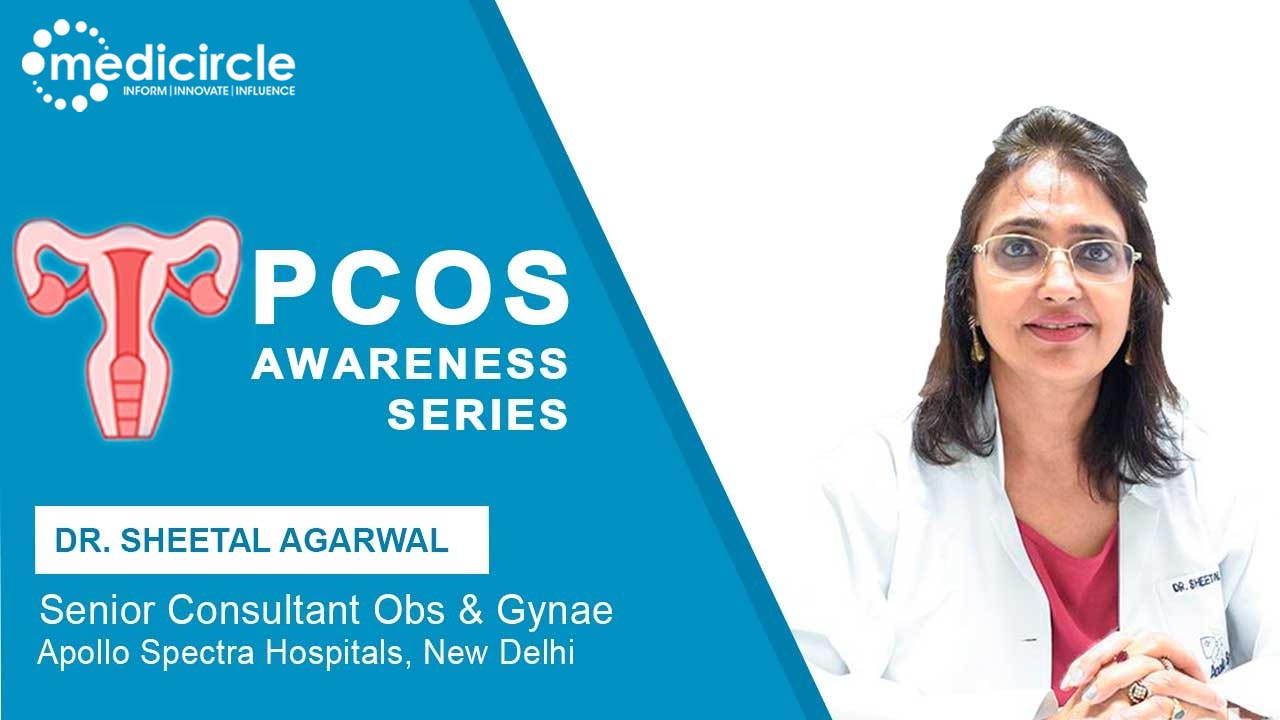Dr. Sheetal Agarwal is a renowned Gynaecologist & Obstetrician with 23 years. She has expertise in Diagnostic laparoscopy, Tubal reversal with laparoscopic, Ovarian cysts, and Cystectomy. She is a lifetime member of AOGD, FOGSI, and the National Academy of General Surgery (MNAMS).
Dr. Sheetal begins, "PCOS is very common. Patients are very anxious and scared about this topic. These patients need to be properly counseled and guided.
PCOS Symptoms
Dr. Sheetal says, “At the time of menarche, periods are often irregular and over the period of 1-2 years, it gets regular. Because of COVID and a sedentary lifestyle, there has been a spurt in the cases of PCOS. Some common symptoms of PCOS are
1. Irregular menstrual cycle
2. Obese PCOD is very common but these days lean PCOD is on high.
3. Patients have male pattern distribution of hairs, upper lip hair growth, chin hair growth, excessive facial hairs, thin hair.
4. A typical patch on the back of the neck.
5. Acne is very common; acne is most commonly seen on the back.
All these things are due to an increase in the male hormone, testosterone in the female body. Testosterone is present in free and total form. It is the high free testosterone that is causing male pattern distribution of hairs, acne, and increased sebaceous glands. In the reproductive age group, infertility is very common due to PCOS. In case, the women conceive, miscarriage/abortion often takes place.”
Endometriosis and PCOS
Dr. Sheetal expresses, “Endometriosis and PCOS are two different things.
Endometriosis – Blood that comes out through the vagina at the time of periods, in endometriosis apart from this, the blood is thrown backward. Blood gets spilled in the peritoneal cavity. There they form chocolate cyst over the ovaries that causes endometriosis. It has four grades.
PCOS – In normal cases, every month, an egg is formed in the ovaries and is released. But in PCOS, ovaries form eggs but are not released into the system. They remain in the ovaries, giving them an appearance of polycystic ovaries. Small cysts of 1-2 cms are formed in the ovaries which are unreleased follicles (eggs) that are formed in the ovaries but are not released in the system.”
PCOS diagnosis – Biochemical tests
Dr. Sheetal emphasizes, “PCOS diagnosis by ultrasound is not the ultimate diagnosis. The biochemical diagnosis gives the conclusion for PCOS wherein we perform hormonal tests. It is done on day 2 of the periods. Hormones that are being tested are
1. LH (Luteinising hormone)
2. FSH (Follicle Stimulating Hormone)
3. Prolactin
4. Testosterone
5. Serum insulin levels for hyperinsulinemia
6. BSF, PP
7. DHEA levels
If the ultrasound report is not showing PCOS but you have the symptoms, in this case, we perform lab tests. Lab tests are very important. After 9 months of treatment, we again conduct lab tests (hormonal tests) to see the improvements.”
How to get pregnant with PCOS
Dr. Sheetal explains, “Whenever a patient comes with PCOS, we suggest her lifestyle change. If they are thinking of family planning, we ask them to lose 10% of their weight first. Counseling is very important. Losing some weight can give successful pregnancies. With weight reduction, ovulation and implantation chances increase. This reduces the risk of a hyperinsulinemic state. We also start metformin to take care of hyperinsulinemia. So, all this together (weight reduction, lower levels of insulin, and metformin tablets) help to have a successful pregnancy outcome. Proper counseling and right guidance can give good pregnancy outcomes.”
PCOS treatment – Ovarian drilling
Dr. Sheetal stresses, “Whenever you start seeing symptoms of PCOS, immediately consult a doctor. Be vigilant for your health. If you are young and have PCOS, first we try to medically treat you before you get pregnant. But suppose you are in your mid-30s, you have PCOS, and want to have babies, in this case, we don't have enough time to medically treat you. As hormonal treatment may take 1-2 years for reversing of PCOS and by this, you may enter in the late 30s. In such cases, we do a laparoscopy. We perform ovarian drilling, wherein we rupture each cyst and after 2-3 months, the patient starts ovulating and she becomes pregnant. Every case is different, treatment options are different. Women know their body best, whenever you notice any unusual change, do consult your doctor.”
Lifestyle change for PCOS
Dr. Sheetal concludes, "Lifestyle change is the backbone of the treatment. Lifestyle modification is the main treatment therapy. Now it is more common because of a stressful lifestyle."
Chromosomal abnormalities and PCOS
Dr. Sheetal adds, "PCOS and chromosomal abnormalities are two different things. PCOS is mainly due to lifestyle changes, stress-related changes. PCOS pregnancy may have chromosomal abnormalities."
(Edited by Renu Gupta)

 PCOS diagnosis by ultrasound is not the ultimate diagnosis. The biochemical diagnosis gives the conclusion for PCOS wherein doctors perform hormonal tests. It is done on day 2 of the periods. Get more information on the treatment of PCOS by laparoscopy from renowned Dr. Sheetal Agarwal.
PCOS diagnosis by ultrasound is not the ultimate diagnosis. The biochemical diagnosis gives the conclusion for PCOS wherein doctors perform hormonal tests. It is done on day 2 of the periods. Get more information on the treatment of PCOS by laparoscopy from renowned Dr. Sheetal Agarwal.







.jpeg)


.jpg)









.jpeg)





.jpg)




.png)



